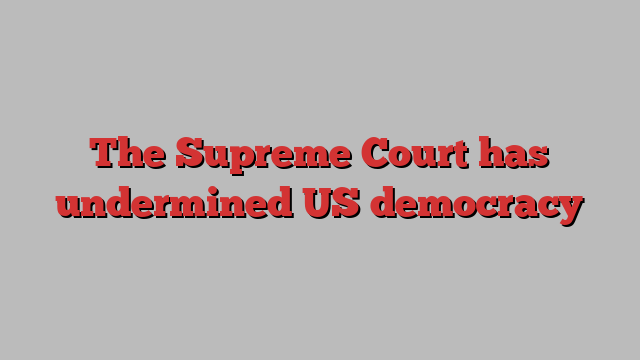
Unlock the US Election Countdown newsletter for free
The stories that matter on money and politics in the race for the White House
Just a few weeks ago, a Manhattan jury found former president Donald Trump guilty of 34 felony counts. Its decision affirmed an idea that is the bedrock of American democracy: no one, not even a former president, is above the law. Monday’s Supreme Court decision in Trump vs United States seems to undercut that principle.
In a 6-3 decision regarding Trump’s claims of immunity over allegations that he sought to overturn the 2020 election result, the court radically expanded the notion of presidential immunity. It argued that a president may not be criminally prosecuted for exercising “core constitutional” duties, such as commanding the military, and has “presumptive immunity” for “official” acts.
The majority opinion, penned by Chief Justice John Roberts, suggests “official” could apply to anything a president does with the agencies under their jurisdiction. A president, it states, has no immunity for “unofficial” acts.
Lower courts will now have to draw the boundaries between what were official and unofficial acts. The Supreme Court ruling almost certainly pushes any trial over the election interference case beyond the November election. Voters are then deprived of knowing the outcome, and Trump could throw the case out if re-elected. The court has also forever altered the US system — in a way that not only a returning Trump but other future presidents could take advantage of.
In another era, this decision might be seen as less a dangerous harbinger, and more a subject for high-flown debates. Ever since the 1982 Nixon vs Fitzgerald case, the court has been clear that a president is immune from civil liability for actions taken in office. The court has now extended that principle, arguing that an “energetic, independent” executive should not be deterred from taking necessary action by concerns over potential criminal prosecution after leaving office.
Criminal conduct seemed unlikely for most past presidents, who, despite their failings, generally sought to occupy the “place of moral leadership” that Franklin Delano Roosevelt argued is the core of the role. But we have now observed the extent to which an occupant of the White House can erode democratic norms. Trump’s first term, despite some limited economic successes, was characterised by a disregard for the rule of law and the electoral system, as evidenced by two impeachment trials and the sundry criminal cases against him and his former staff.
A second term promises to be even more incendiary. Trump has vowed to be a “dictator” in his first day in office, and has all but promised to wield the immense powers of the office to punish his political enemies. In expanding presidential immunity, the Supreme Court has in effect granted Trump — and all future presidents — carte blanche.
With courts now unable to hold a president accountable for most actions taken in office, the ruling shunts that responsibility on to the Senate and the House of Representatives. But as Trump’s failed impeachments show, the current polarised US legislature has proved particularly ill-equipped to restrain a demagogue.
Trump may lose in November, and a lower court may still find him liable for “unofficial” acts related to his attempts to overturn the election. But the Supreme Court’s decision has done lasting damage. The American Revolution — which Ralph Waldo Emerson called “the shot heard round the world” — helped spur an international movement away from tyranny and towards democracy and accountability. By prioritising an “energetic” presidency over an accountable one, the court’s conservative justices have chipped away at a central pillar of the American system.